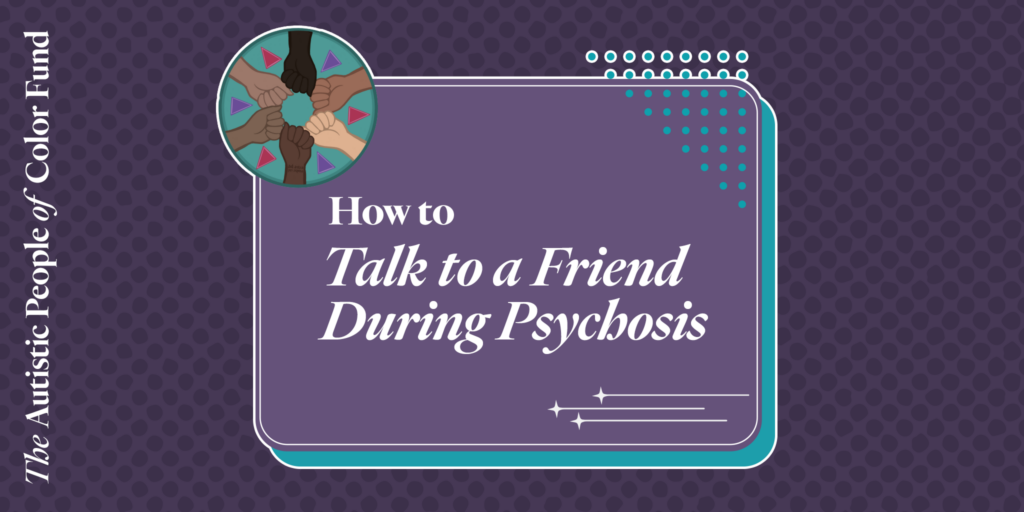How To Talk to a Friend During Psychosis

Psychosis is an altered state connected with several psychosocial disabilities, including schizophrenia, schizoaffective disorder, and bipolar disorder. In psychosis, people’s perceptions of reality become substantially different from others’. The main symptoms of psychosis are hallucinations (sensory perceptions that others may not see) and delusions (unusual, fixed beliefs that don’t match consensus reality). Psychosis can be a long-time event for some people, as in schizophrenia, or it can be episodic, as in bipolar disorder.
Encountering someone in psychosis—or other altered states—can be confusing, disconcerting, and bewildering, especially if you’ve never seen it firsthand. You want to support them, but you may not know how, especially when your friend is acting wildly out of character. The shock may make it difficult for you to see beyond the delusions and hallucinations—but it’s essential to keep your cool to support your friend throughout their crisis. Here is some advice to help you approach others’ psychosis in a calm, thoughtful way.
Take care of yourself first.
To be able to support your friend, you should take care of yourself first, however you define that.
Know your boundaries.
Don’t commit to things that will merely wear you out and make it harder for you to support your friend. Be clear about what you can and can’t do for your friend if they directly ask you for help.
Use a clear, even tone, either in speech or in writing.
Psychosis can be extraordinarily stressful, especially for people who believe that they’re being persecuted or attacked. Sounding like the voice of reason will help calm the person down, even if they continue to believe or see things that others don’t.
Listen to your friend—it’s the best thing you can do.
That applies even if you don’t know exactly what to do to make everything better. Having a listening ear can help your friend feel grounded, especially when they’re terrified.
Acknowledge the validity of your friend’s feelings without reinforcing the delusion or hallucination.
Remember that there’s often a core of truth underlying delusional statements. The feelings underneath them are very real, even if the facts aren’t.
- “I know this is really scary for you.”
- “That must be terrifying. I hope things become safer for you soon.”
You can push back gently against some delusions, but don’t expect your friend to change their mind immediately. Sharp denials are more likely to be met with angry resistance. “John just seems like a normal guy to me. How did you end up concluding that he was a terrorist?” is better than “John’s not a terrorist. How could you say that about him?”
Acknowledge cultural dimensions of psychosis.
Systemic oppression can play a role in how psychosis presents itself. For example, a Black person may believe that they’re being persecuted by white nationalists. Others may have culturally specific spiritual experiences combined with psychosis. In this case, it’s important to treat the spiritual component as valid without reinforcing delusions or hallucinations.
- “It’s scary to live in a society that devalues you for your race.”
- “It sounds as though there’s a lot going on in your spiritual life.”
Ask your friend if there’s anything they need.
People undergoing psychosis may have a harder time taking care of themselves than they would otherwise. They can think they’re immortal or no longer need to eat. Encourage them to eat for your sake, since you’re worried about them.
Don’t call the police.
Involving the police during a mental health crisis can merely exacerbate the problem and result in violence against people in altered states. One-fifth of fatal police shootings between 2015 and 2024 involved people with psychosocial disabilities. Calling the police may also result in forced hospitalization, a kind of incarceration that doesn’t always solve the problems they are ostensibly supposed to.
Instead, consider community-based support, either informal or through an organization dedicated to helping people in crisis, such as LUNA Community Care or the Wildflower Alliance. Some mental health organizations also offer alternatives to full-security hospitalization, including crisis beds, drop-in centers, or respite houses.
Be mindful about what you discuss after the episode is over.
Don’t mention specific hallucinations or delusions after the episode is over. “I remember when you thought that confusing your for you’re was a sign of the apocalypse.” Mentioning delusional beliefs or hallucinatory perceptions may be embarrassing for the person, even if it’s just amusing for you. Make sure discussions like this happen on your friend’s terms. Moreover, some of the themes in delusions and hallucinations may be connected to real-life trauma, so you may inadvertently trigger your friend when you talk about their altered state.
If you have the time and resources, work with your friend on a crisis plan just in case an episode happens again.
Having a good crisis plan can help mitigate the worst parts of a psychotic episode. Crisis plans can include having a list of trusted friends’ numbers to call if hospitalized, a “failure-state guide” that lists signs of psychosis that your friend may exhibit, making a copy of your friend’s keys so that you can visit them if needed, and more.